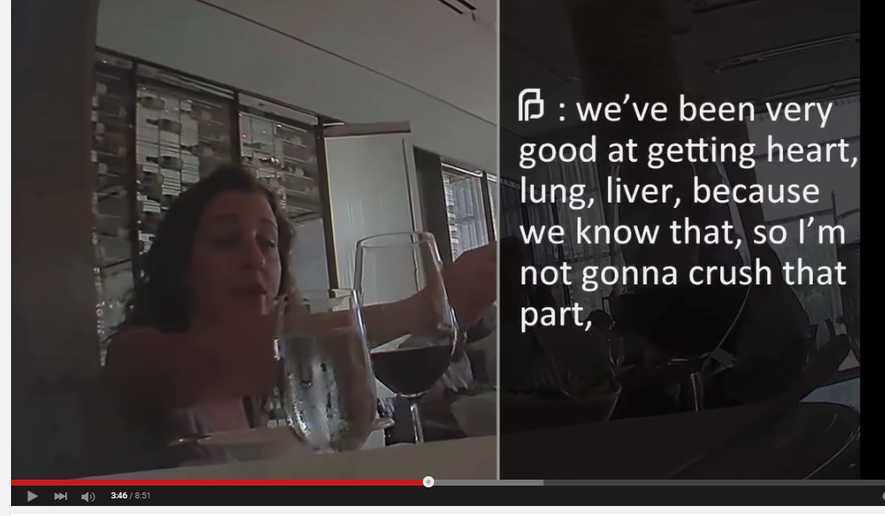ANALYSIS/OPINION
In a scene reminiscent of “Silence of the Lambs,” a brilliant doctor sits at a table casually munching on salad and sipping red wine (a nice Chianti?) while salivating over the prospect of harvesting the “tender” livers of aborted babies. No, this is not a pitch for a new horror movie. This is actually what happened in a video recently released by the Center for Medical Progress, which has since been viewed millions of times on the Internet.
In the video, Planned Parenthood’s senior director of medical services, Dr. Deborah Nucatola, nonchalantly details the ins and outs of supplying the medical research industry’s seemingly insatiable demand for fetal tissue. The juicy tidbits (no pun intended) of the three-hour lunch interview depicting Dr. Nucatola’s strategic fetal organ “harvesting” efforts have already become media fodder, but the subtler — and arguably more macabre — implications of Planned Parenthood’s activities have gone largely unexplored.
Not content to hunt and peck for aborted fetuses at small local clinics, Dr. Nucatola wants to create a stable pipeline of tissue supply, and suggests to the undercover CMP agent posing as a medical research tissue supplier to look into Cook County Hospital in Chicago, because “there you have the best opportunity to get those larger cases.” “It’s in the center of Chicago” she continues, “two airports, plenty of opportunities there.”
It is clear that Planned Parenthood is facing somewhat of a problem in that each of its medical clinic “affiliates” around the country apply different procedures with regard to the issue of consent to use aborted fetuses for medical research. And yet Planned Parenthood seems to want to drive tissue supply, and doing that ostensibly requires more women to consent to tissue donation.
Of course, a fine line exists between a patient requesting donation or “opting” on a generic consent form to donate tissue, and the clinic or some outside party “coercing” a patient into donating the tissue for research. Dr. Nucatola is well aware of the ethical dilemma here, in the sense that in order to best “harvest” certain types of tissue, the doctor has to know in advance whether the patient has consented. And herein lies a bright ethical line that Dr. Nucatola crosses. “For example, what I’m dealing with now, if I know what that they’re looking for, I’ll just keep it in the back of my mind, and try to at least keep that part intact.” Whoa.
The whole defense of abortion has been typically cast in the media as two primary issues — a woman’s right to choose and the sanctity of the doctor-patient relationship. But here the doctor introduces a third element. The medical procedure itself could be altered depending upon whether the doctor intends to keep some parts of the fetus intact for later sale to a tissue supplier. This would necessarily have implications on the safety of the procedure, which, while they “may” be minimal, should in no way be in the mind — even the back of the mind — of a doctor performing a major and potentially risky operation.
It is clear from the conversation that Dr. Nucatola believes there is a different ethical standard being applied at “private” (ostensibly for-profit) clinics than at Planned Parenthood. “I’m telling you, Family Planning Associates, they may go for their money.” That is, a tissue provider might be able to compete for aborted fetal parts at those places by offering a higher price than Planned Parenthood could ethically charge. However, as she points out, “their volume’s not going to compare to Planned Parenthood’s volume. We have 40 percent of the market in the whole country.” Another ethical line just ran over here: Federal law specifically prohibits the sale of fetal body parts, and yet the chief medical officer of Planned Parenthood casually implies that they have cornered the market.
Some pro-choice groups have roundly criticized CMP for using deceptive practices in uncovering Planned Parenthood’s baby parts syndicate. But it matters whether CMP’s activities actually yielded pertinent and truthful information about Planned Parenthood’s orientation to the health of their patients. Clearly it did.
Imagine our doubting the ingenuousness of a pedophile quibbling with the producers of the NBC show “To Catch a Predator” over using deceptive practices to lure them into trying to have sex with an underage child. It would be deemed laughable and dismissed out of hand. The techniques CMP employed do not even come close to entrapment — the intentional enticement of someone who would otherwise not even consider committing a crime — because, as Dr. Nucatola readily admits, “behind closed doors, these conversations are [already] happening with affiliates.”
In a final tragic postscript, Dr. Nucatola describes how she got into the fetal tissue business in the first place. On her last day as a resident “there was a patient that was transferred to me, from an outside clinic, who had [a] late second-trimester abortion; she was bleeding, and she looked up at me, and she said, ’Don’t let me die.’ And she actually bled to death.”
It was at that point that Dr. Nucatola decided to specialize in abortions, because she did not want any more women to die from the procedure. But along the way, the person who emerged obviously became comfortable steering a for-profit fetal tissue supplier to a private clinic with lower ethical (and perhaps medical) standards.
• Armstrong Williams is sole owner/manager of Howard Stirk Holdings and executive editor of American CurrentSee online magazine.
• Armstrong Williams can be reached at 125939@example.com.




Please read our comment policy before commenting.